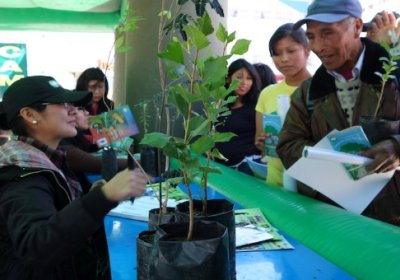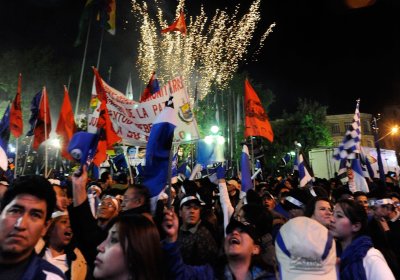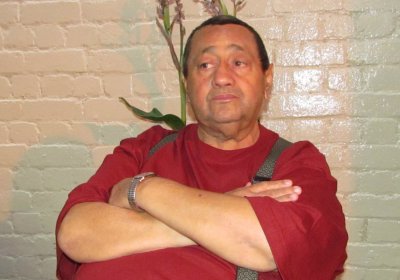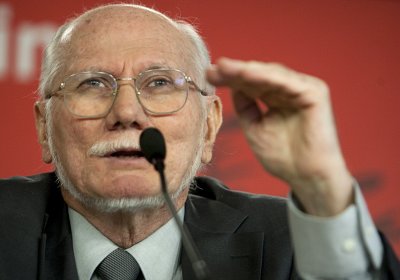 Had Hugo Chavez not passed away in 2013, the former Venezuelan president and revolutionary socialist would have turned 61 on July 28. However, though Chavez is gone, his indelible imprint on Venezuela’s political landscape endures.
Had Hugo Chavez not passed away in 2013, the former Venezuelan president and revolutionary socialist would have turned 61 on July 28. However, though Chavez is gone, his indelible imprint on Venezuela’s political landscape endures.
Federico Fuentes
 Had Hugo Chavez not passed away in 2013, the former Venezuelan president and revolutionary socialist would have turned 61 on July 28. However, though Chavez is gone, his indelible imprint on Venezuela’s political landscape endures.
Had Hugo Chavez not passed away in 2013, the former Venezuelan president and revolutionary socialist would have turned 61 on July 28. However, though Chavez is gone, his indelible imprint on Venezuela’s political landscape endures.
When Bolivian President Evo Morales announced in May that his government was allowing oil and gas drilling in national parks, mainstream and progressive media outlets alike were quick to condemn his supposed hypocrisy on environmental issues.
Writing for the Associated Press, Frank Bajak argued that although Morales is known internationally for his outspoken campaigning on climate change, at home he faces constant criticism from conservationists “who say he puts extraction ahead of clean water and forests”.
A great companero, colleague and friend, Roger Burbach, passed away on March 5 at the age of 70. I had the privilege of working with Roger on a book we co-authored, together with Michael Fox, titled Latin America’s Turbulent Transitions: The Future of Twenty-First-Century Socialism.
Since the start of the year, many newspapers have dedicated article after article to predictions of a looming demise of South America's so-called “Pink Tide”
The term “Pink Tide” is used to refer to the wave of left-of-centre governments elected in South America in recent years.
Several such governments have recently been up for re-election. Pollsters and commentators alike argued that for many, their time in government was up.
Instead, on October 26, Brazilians re-elected Dilma Rousseff as president, ushering in a fourth consecutive Workers’ Party administration.
Predictions by pollsters and commentators that Evo Morales would easily win Bolivia’s October 12 presidential elections were confirmed when he obtained more than 60% of the vote.
Most, however, differ over why, after almost a decade in power, Morales’ Movement Towards Socialism (MAS) continues to command such a huge level of support.
Their explanations tend to focus on specific economic or political factors, such as booming raw material prices or the MAS’s ability to control and co-opt the country’s social movements.
Although I had met Luis before, I first got the chance to really speak to him at a BBQ he hosted at his house in late 2010. We spoke for hours that day about many things, including his health.
Luis explained to me that his body was riddled with cancers, and that the doctors had told him he probably only had six months to live.
“When did they tell you that?” I asked.
“Six months ago,” he replied with a grin on his face. “Don’t worry, I still have plenty of fight still left in me.”
A fortnight out from Brazil’s October 5 national elections, the big news is the significant surge in support for Marina Silva, with some polls predicting the former Workers’ Party (PT) government minister and environmental activist could end up winning the presidential race.
Incumbent president and PT candidate Dilma Rousseff maintains a narrow lead over Silva, but the election will almost certainly go to a second round run-off on October 26.
Activities were held across South Africa on August 16 to mark the second anniversary of the Marikana massacre, in which 34 striking mineworkers were slain by state security forces.
The killings occurred one week into a strike over pay by several thousand rock drill operators at the Lonmin-operated platinum mine in Marikana.
Despite the massacre, workers remained on strike. One month later, they won a settlement that met a large part of their pay claim.
About 30 international guests and 120 shop stewards from the National Union of Metalworkers of South Africa (NUMSA) met over August 7 to 10 in Johannesburg to discuss building a new, left alternative to the ruling African National Congress (ANC).
This challenge to the ANC by the country’s largest trade union, with more than 440,000 members, has caused shockwaves throughout the country. An August 6 Times Live article said the process was “likely to lead to the birth of a workers' party that will eventually challenge [the ANC] for power”.
When Evo Morales was elected president of Bolivia in 2005, he promised to “govern by obeying the people”.
The recent approval by the Plurinational Assembly of laws dealing with mining and children’s rights are two examples of the challenges and benefits of this radical approach to governing.
Breaking with the idea that legislating should be confined to parliament, the Bolivian government has made repeated efforts to involve broad sections of society in rewriting laws.
One of the most important public debates over the future of Venezuela’s revolutionary process has opened up after the publication of a document by recently ousted planning minister Jorge Giordani.
In it, Giordani launched a series of scathing criticisms of the “new path” he says the government has taken since former president Hugo Chavez died in March last year.
Giordani dropped the bombshell on June 18, a day after he was removed from the post he had held almost uninterruptedly since 1999.
The publication of a document highly critical of the government of Venezuelan President Nicolas Maduro, authored by one of the longest-serving ministers in former president Hugo Chavez’s government, has triggered an unprecedented debate among Venezuelan revolutionaries.
Jorge Giordani dropped the bombshell on June 18, a day after he was replaced as planning minister. This was preceded by his dismissal from the boards of Venezuela's Central Bank and state oil company PDVSA, the state oil company. He had held the post almost uninterruptedly since Chavez first came to power in 1999. .
- Previous page
- Page 17
- Next page









